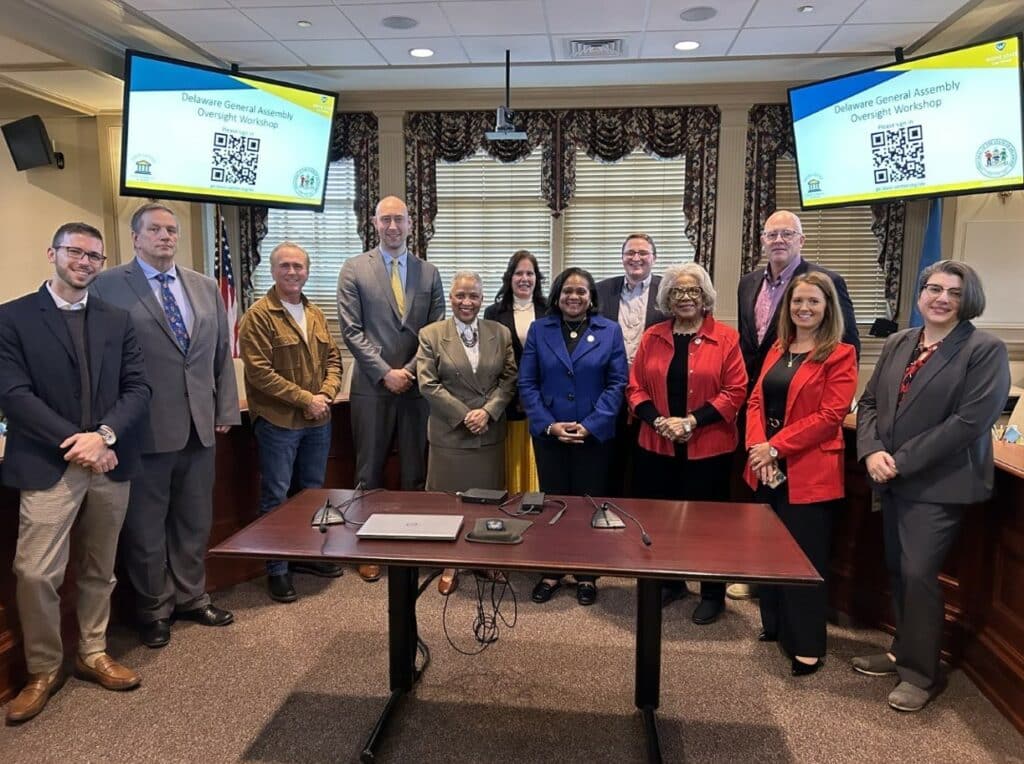
Last week, the Levin Center conducted its 18th Congressional Oversight Boot Camp on Capitol Hill, in partnership with the Project on Government Oversight (POGO). The Boot Camp is a dense, two-day program. It covers everything from the historical and legal basis of legislative oversight to the practical details of putting together a media plan for a hearing, and it is packed with lectures from experts and interactive exercises.
Since our founding, these workshops have been a hallmark of the Levin Center’s programming. As the State Oversight Academy ramped up over the last year, we built and offered oversight training inspired by the congressional boot camp to state legislators and the people serving them. Our team has traveled across the country – on planes, trains, automobiles (and at least one rental bike) – to speak with legislators and their staff, present at policy conferences, and even provide committee testimony.

So, what happens in a State Oversight Academy workshop? It’s a little different every time. It depends on the length of the program, the interests and experience levels of the group, and the specifics of the state. In general, though, it goes something like this:
When we visit a state legislature, we like to start the program with the people we call “oversight partners”: auditors general, legislative research staff, ombuds, and so on. (As a reminder, you can find your state’s oversight partners on the State Legislative Oversight Wiki.) Bringing in oversight partners is a way to introduce state legislative oversight with local expertise and rich institutional knowledge. It helps participants understand the tools at their disposal and puts faces to names in governments that often work through email. It is also a great opportunity for presenters to showcase their work to legislators and offer context around recent oversight efforts from other corners of government.
After hearing from local experts, State Oversight Academy instructors take the stage for a presentation on the basics of legislative oversight. There is a lot of material to cover – everything from a history of oversight and its legal basis to the practical details of bipartisan cooperation on investigations. Along the way, we bring in stories from oversight work across the country, best practices backed up by the latest research, and much more.
During shorter workshops, we follow the presentation with an exercise to give participants hands-on experience with the material. At a recent workshop in Delaware, participants worked on an oversight plan in the wake of a fictional hurricane, deciding what information they would need to get, the tools they could use to find it, and how their oversight work could help inform disaster recovery policy in the future.

In full-day workshops we split the presentation portion into several parts (typically investigations, hearings, written products, and follow-up) and conclude each section with a group project centered around a simulated scandal – the closest anyone can get to state government fan fiction.
In a recent Pennsylvania workshop, participants planned an investigation, a hearing, and follow-up activities for a (completely fictional) state hospital system caught up in swirling accusations of ill-gotten contracts, patient deaths, and failing medical records. The exercise was a deep dive into legislative oversight, with all the nuances of overlapping issues, muddy agency jurisdictions, working across the aisle, and important questions like, “How should a committee handle whistleblowers?” and “What do you do with a high-level state employee who puts ‘tell the civil service guys to kick rocks’ in writing?” Of course, it all comes with plenty of feedback from instructors and peers.

That peer feedback gives participants a rare opportunity to work together in a low-stakes situation and to strengthen their connections – especially with their colleagues across the aisle. As much as anything else, SOA workshops are a chance for legislative professionals to collaborate with colleagues to develop their own oversight pursuits and to be inspired by the good they can do with their existing powers and resources.
The results speak for themselves. “I learned that there is an appetite for genuine oversight in Delaware,” wrote one participant who joined us on a December afternoon in Dover. Another recent participant wrote on their evaluation that “The exercises were terrific to actually walk through the process and gain a practical understanding.” At one regional conference of state government professionals, the State Oversight Academy’s oversight session was the most highly rated session by participants.
We share this not to boast, but because we would love to show you more, and we know good government requires oversight. If you’re interested in state legislative oversight (and if you’re not, what are you doing here?), we’ll visit your state and showcase through a workshop the power of collaborative oversight to enforce legislative authority on governmental performance monitoring. We’ll join your Zoom webinar. We’ll fly across the continent to present in a committee room with five people or the floor of a packed legislative chamber. We’ll speak to your oversight committee, caucus, staff retreat, new member orientation, or policy conference (and, while we haven’t been asked to do any weddings or bar mitzvahs yet, there’s a first for everything).
So, (and here comes the first sales pitch in the history of the SOA blog) we’d love you to get in touch. You can contact Ian McKnight (ianmcknight@wayne.edu) and Ben Eikey (benjamin.eikey@wayne.edu) to get started. Whether you’re looking for a lunch and learn, an all-out simulated scandal extravaganza, or an in-person workshop or a virtual event, we’ll put together an oversight program you and your participants will love – and that will make a positive impact on your state’s oversight work for years to come.


